You might have heard mixed messages about online translators and dictionaries: most are free and easy to access, but are they trustworthy? It depends a lot on what you’re looking for and how you’re going to use it. Even the best tools are only useful in the right hands!
There are definitely ways to use online translators and dictionaries to support your learning. In this post, we’ll share some tips for using online translators.
Dictionaries versus translators: what’s the difference?
Bilingual dictionaries translate from one language to another and give you some information about different translation options. Dictionaries are great resources when you have a specific word you want to know in another language, particularly if you already know a bit about it, like what part of speech it is (noun, verb, etc.) or the phrase it’s used in. For example, if you have a specific verb (e.g., “to eat”) in mind, an online dictionary is the perfect resource. You can also use a dictionary to double-check whether the translation you got from an online translator is accurate! But even then, you’ll want to stick to individual words or short phrases.
Translators are better suited for looking up longer phrases (e.g., “I already ate some food”), and they’re also quite helpful with verb conjugations (e.g., “I eat,” “she eats”) and what order to put words in. The more information you give the online translator, the better results you’ll get! But online translators can present challenges and lead to trouble if you don’t know enough of the language to evaluate the translation.
Deep dive into the dictionary
Dictionaries are perfect when you know some of what you want to say, but you’re missing a specific word. If you already know that “I don’t have” in Spanish is no tengo, but you’ve forgotten the Spanish word “money,” that’s when you take out your five-pound, two-volume hardcover English-Spanish dictionary — or its 21st-century version, the online dictionary!
WordReference is one such dictionary — and it’s my personal favorite. When you type in “money,” you get multiple translations: dinero, moneda, negocio, etc. That’s because all the different ways we use “money” in English can have different translations in Spanish. So how do you choose? The top option is going to be the most common meaning and translation, and often that’ll be the one you’re looking for. Here, that’s dinero. But if you’re not sure which meaning you want, a good dictionary will include example sentences and brief definitions for each meaning. Linguee.com is an online dictionary that also includes actual examples from news articles, books, and other writing. Check the examples to figure out which meaning is the one you want!
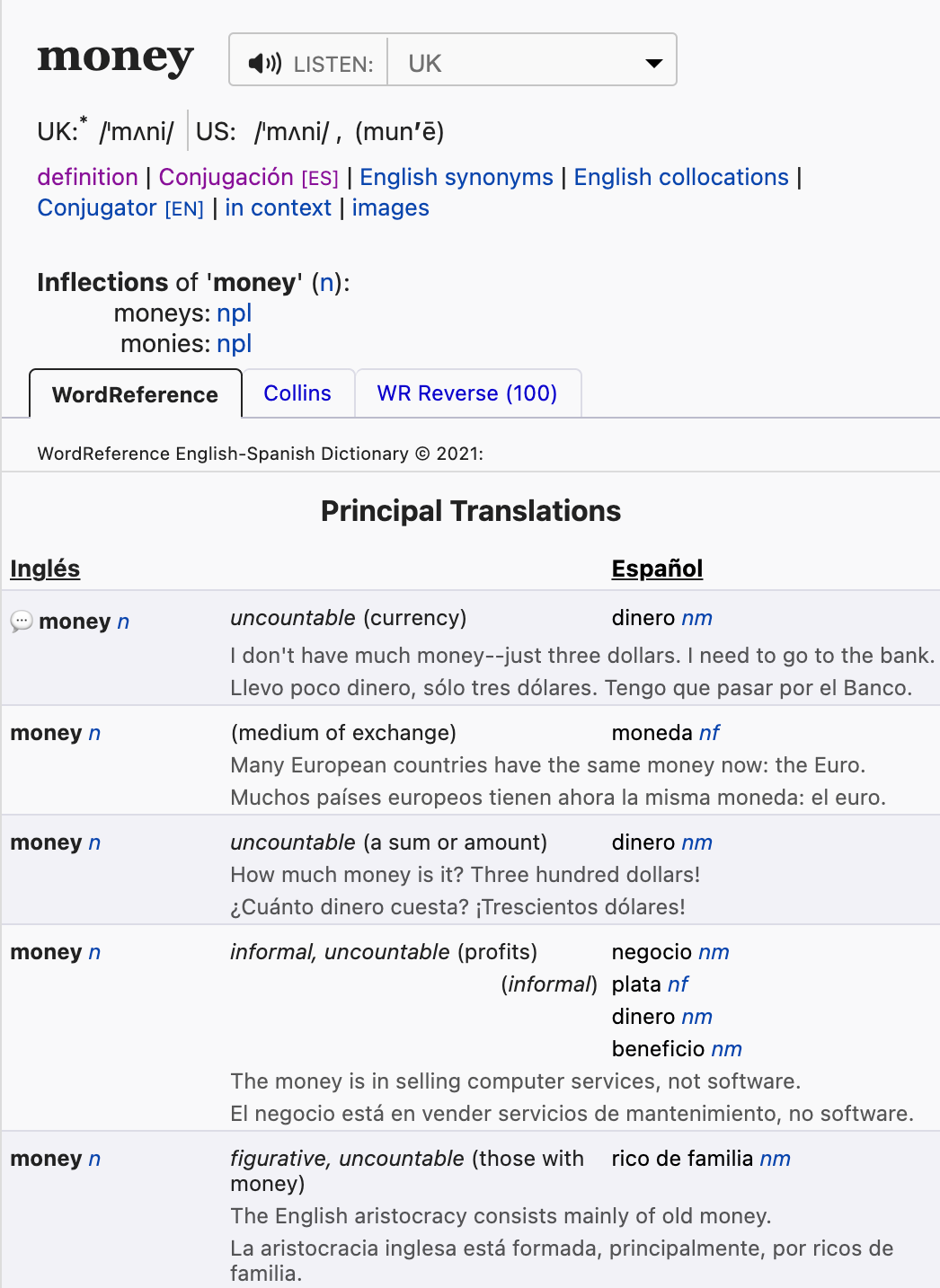
Dictionaries are also great for slang and dialectal variation. Lots of words have different translations depending on the country, region, ethnicity, age, and gender of the speaker. For “money,” you could also use “cash” or “bread” in some instances, and if you’re of a certain age perhaps also “dough” (as in, “I don’t have any dough”). But the most common meaning of “dough,” listed at the top of the entry, is masa, the word for the kind of dough that you bake to make bread. Further down the list you’ll see the informal, slang words for the “money” meaning. They’re marked with coloquial (“colloquial”) and the country where they are used: pasta in Spain (“ES”), guita in Argentina (“AR”), chavos in Puerto Rico (“PR”), and lana in Mexico (“MX”).
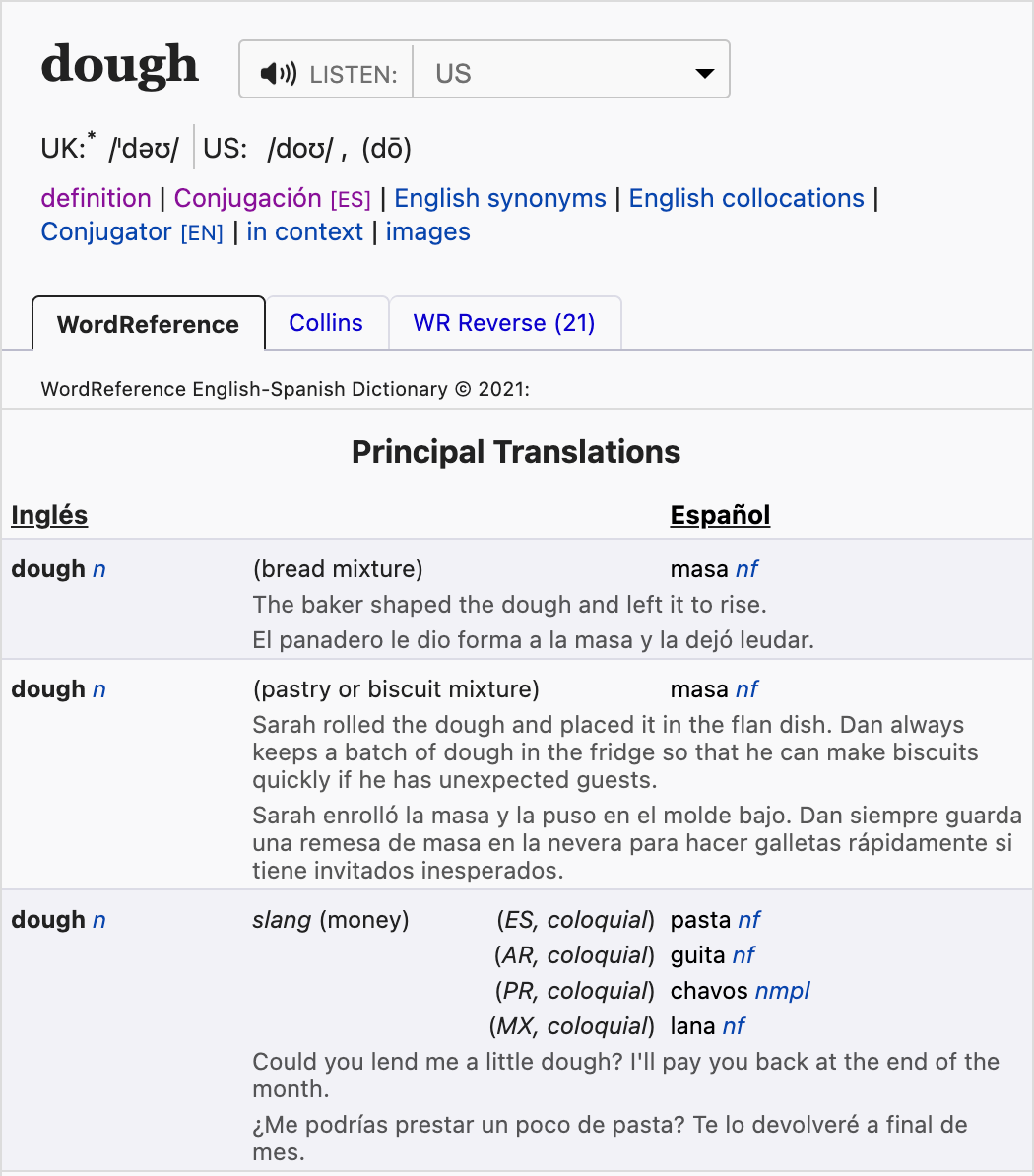
An online translator, however, will typically not give you these dialectal variations in the translation, but online translators can be very useful in other ways!
Top tips for online translators
Using an online translator can be helpful for solving certain kinds of language questions, especially ones about verb conjugations, what order words go in, and how to form longer sentences.
In a dictionary, you can’t look up how to say “I ate” in the past, versus “I am eating” right this second: you can only find the Spanish translation of the infinitive “to eat,” comer. With an online translator, you can type “I ate” and get right to comí, the version of comer that you use with “I” in the preterite.
When using an online translator, include as much information as possible to make sure you’re actually getting what you want. For example, if you’re just trying to find out how to say “we can,” as in “we can go there right now,” don’t type in only “can” — the translator won’t know which meaning you want! It might default to the top entry in its dictionary, which might not be the one you’re looking for. For “can,” that could be for a can of soda, a container like a bucket (“a can of paint”), or the verb meaning to store pickled vegetables in a jar.
| Google Translate, without context |
|---|
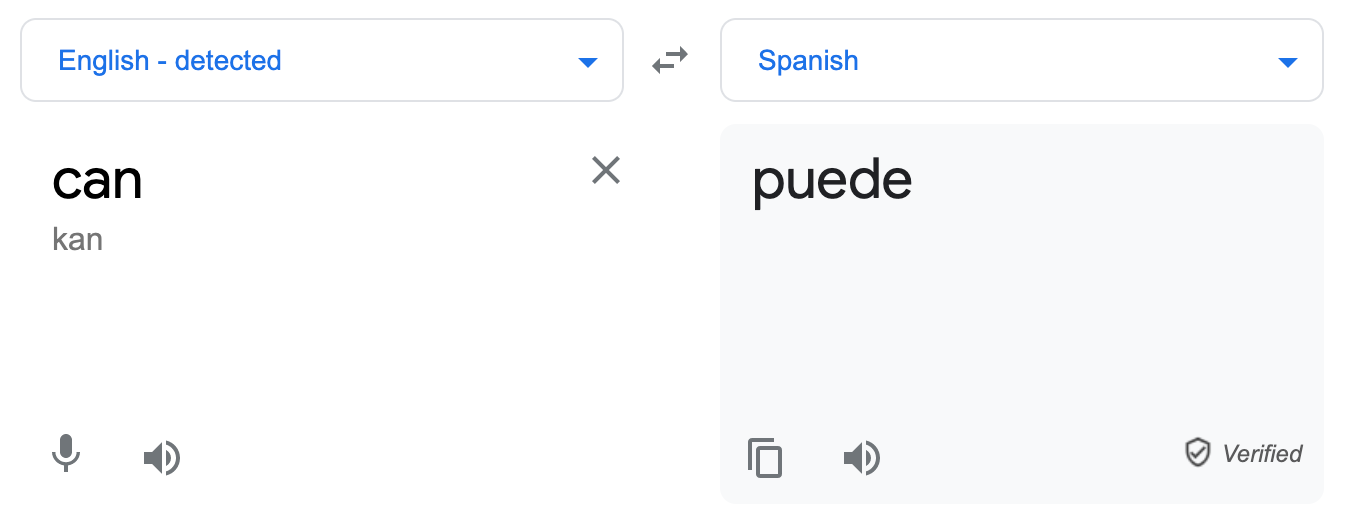 |
| This search for the Spanish word for “can” would be better to do in a dictionary, like WordReference.com. Here, Google Translate is having to guess what meaning and form you want. It guesses you want a verb, but it still doesn’t know which verb you want: in Spanish there are six versions in each tense! There’s one that goes with “I” (“I can”), “you” (“you can”), etc. |
| Google Translate, with some language context |
|---|
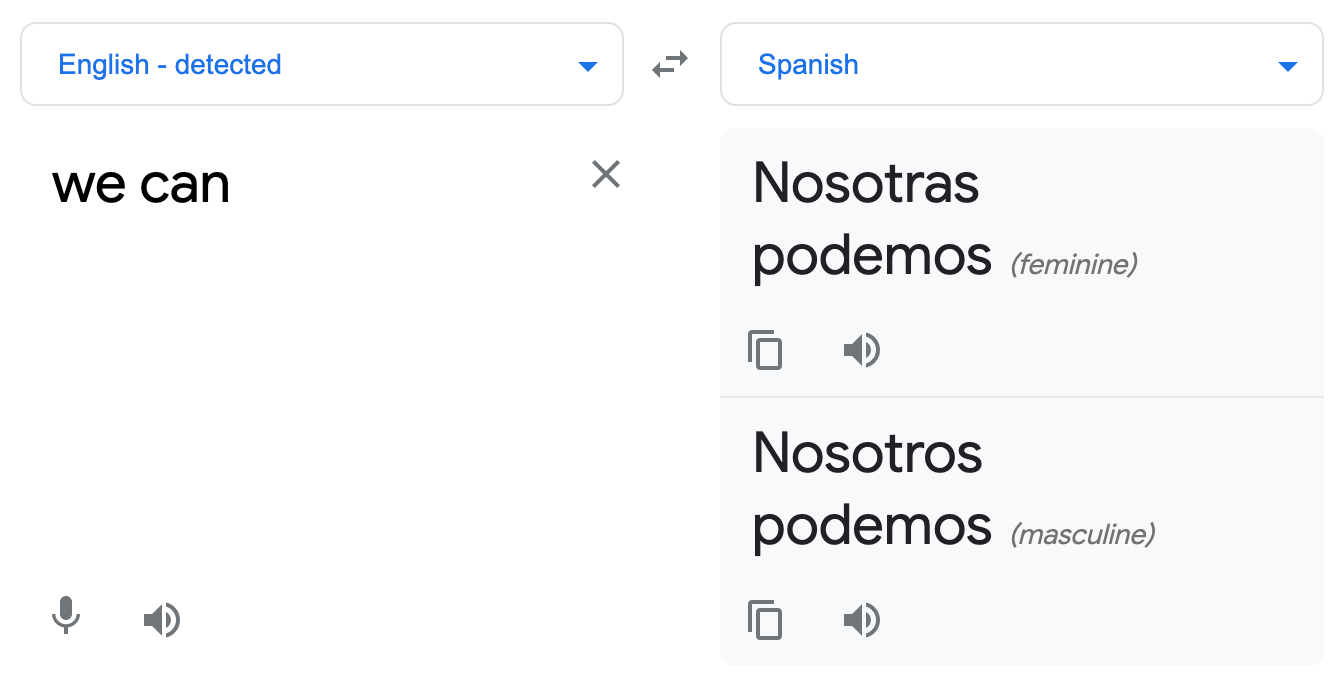 |
| By giving Google Translate a bit more context, you can help it figure out what you’re really getting at: you want the verb form of “can,” the one that goes with “we.” Even still, you get two options, nosotros podemos and nosotras podemos. The verb is the same for both, but as you can see in the right panel, one version of “we” is masculine and the other is feminine. |
Remember the “money” example in the dictionary? If we enter “I don’t have money” in Google Translate, we get No tengo dinero. And that’s right! But what about the colloquial or slang versions of this sentence? If you instead translate “I don’t have any dough,” you get No tengo masa. But recall that masa is the word for the mixture you need to make bread and it does not have anything to do with money. Of course, the online translator won’t tell you this — it doesn’t know what kind of “dough” you have in mind.
That’s why having a go-to dictionary can be super helpful. You can double-check whether masa means “money” or something else — and since it doesn’t mean money, you probably don’t want to use slang terms when using an online translator. Instead, with online translators, stick to specific grammar questions, like verb conjugations, and more “formal” wording, instead of slang terms.
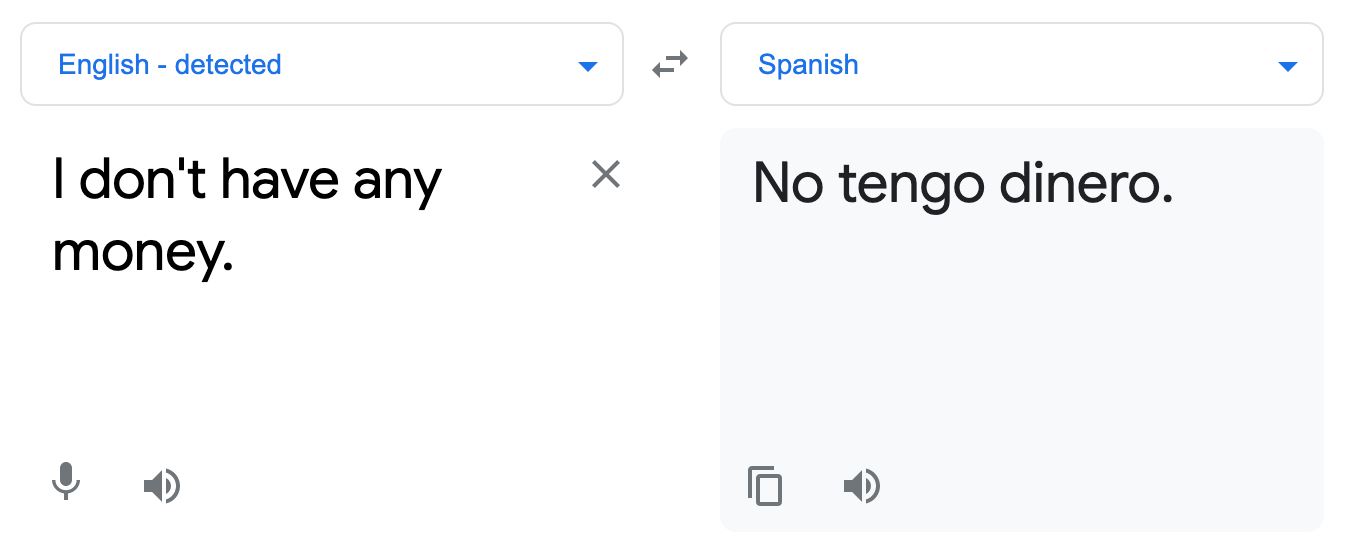
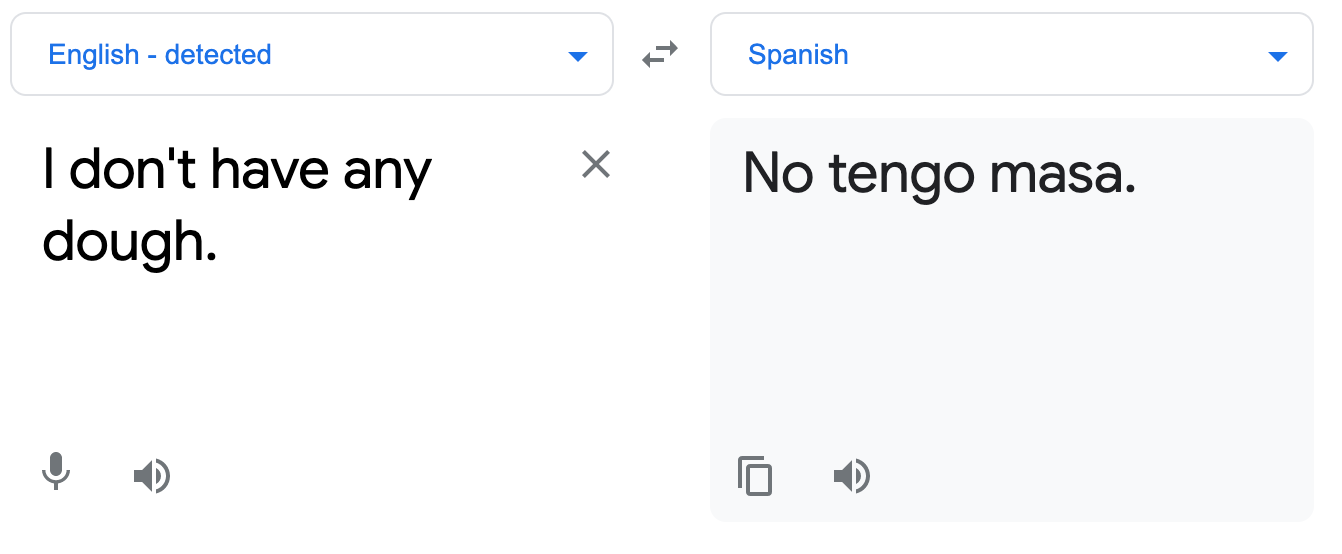
Online tools as your personal learning tools
And there you have it! Online translators and dictionaries can be helpful ways of getting your language questions answered and double-checking your guesses about vocabulary and grammar.
Use a dictionary for single words and to find dialectal variations of a particular word; go with the online translator for complete sentences and to help you with your verb tenses!
For more tips and ideas to support your learning, check out these posts about developing speaking skills in your new language and including creative activities in your language study!
